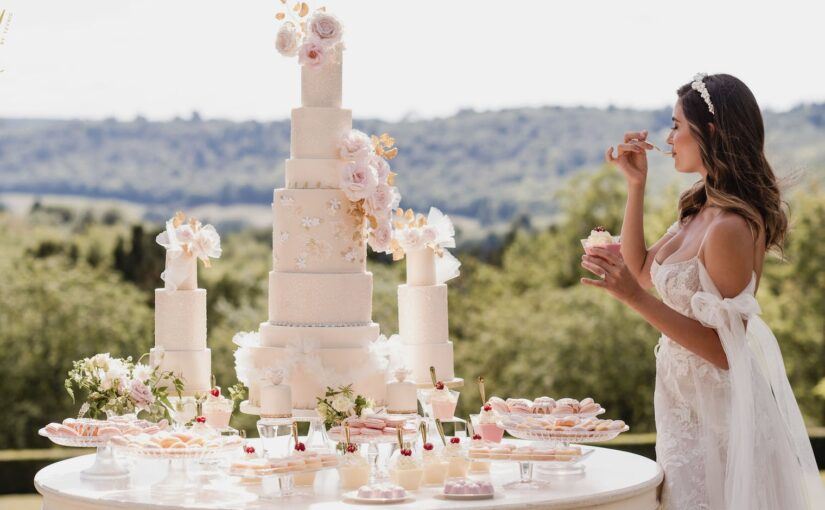If there’s one thing that’s guaranteed to make people happy, it’s cake. We have cake during so many of life’s special times, like birthdays, anniversaries and Christmas. We don’t even really need an excuse – we Brits love afternoon tea, which is just one big excuse to eat cake in the sun. So, we really don’t need a reason to enjoy a nice cake.
In the UK, the average amount spent by couples on a wedding cake is between £400 – £500. This may seem at first look a lot out of the average overall amount spent on a wedding, which is £20,775. But your cake is more than just that. It can play an incredibly central role in your wedding. It will be a centrepiece and focal point. Of all the decorations and touches you add to your wedding, the most memorable for many will be your cake. Your guests will be on the lookout for your cake and will crowd around you just to watch you make that inaugural cut. They’ll also love helping themselves to a slice.
However, the good news is that there are ways to save money on your wedding cake. In this post, we’re going to dive into the many ways you can stay within budget while making sure your guests can have their cake and eat it too.
Why are wedding cakes so expensive?
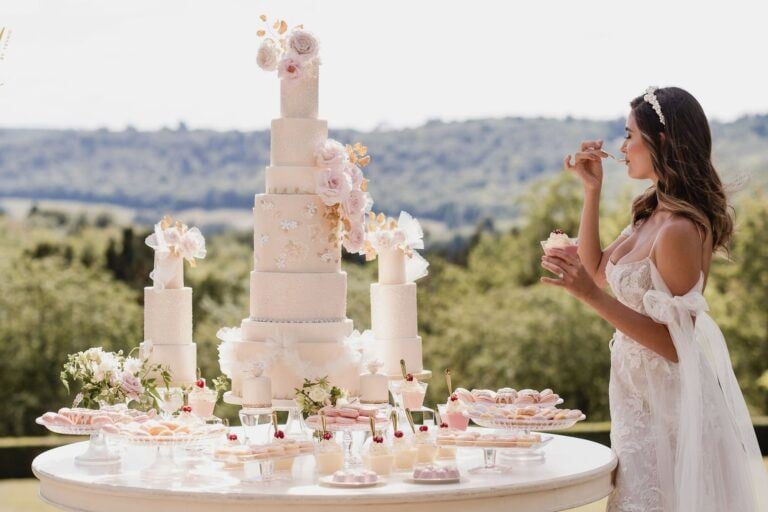
Cakes may be mainly sugar, eggs and flour, but so much skill, time and effort goes into making a wedding cake. They’re often far more extravagant and luxurious than the types of cake you might expect at other celebrations and can take several days to plan, design and bake. Not to mention a lot of wedding cakes are absolutely huge, with three being the traditional number of tiers.
So, while the price of a wedding cake may seem high, bear in mind that a lot goes into one to ensure it looks so magical and inviting for your big day:, bear in mind that a lot goes into one to ensure it looks so magical and inviting for your big day:
- Customisation and design
- Quality ingredients
- Skill and expertise
- Baking and decorating time
- Delivery and setup time
- Tools and equipment
The reputation of the cake maker is also likely to determine how much they charge, with professionals with long and respected careers typically able to charge more than those new to the industry.
A professional cake maker really understands the responsibility they have. The cake has to meet the brief in how it looks. It has to last being on display in a heated space, often for many hours, and still needs to taste perfect. They have one chance to get the cake right, knowing that all eyes will be upon it. There are no hiding places, and all this requires so much skill, expertise and preparation.
Do you need a cake at your wedding?
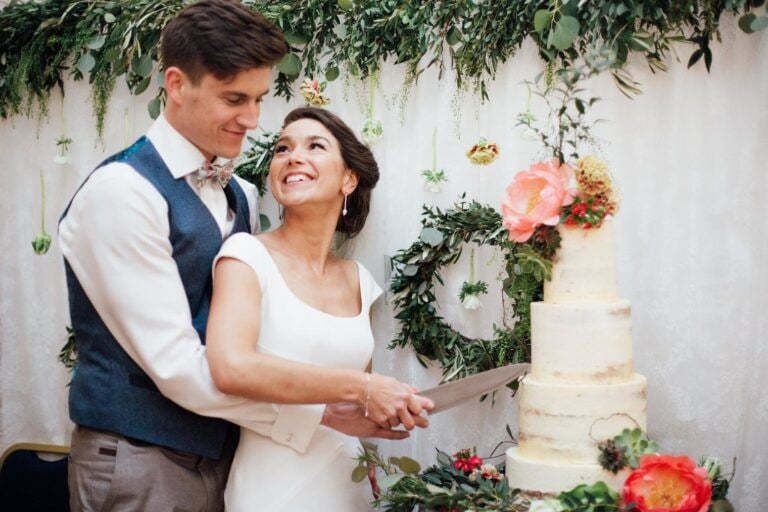
We may have already pointed out that many of your guests will be on the lookout for cake, but it’s important to consider what you want on your wedding day. What are your priorities? Try to please all your guests, and you’ll likely please no one. So, if forking out for a wedding cake isn’t high on your list, and you have a tight budget, you can choose to go without.
Weddings are usually jam-packed with traditions, so even though you won’t get to cut a cake, you’ll still have plenty of opportunities to enjoy other traditions, like the toasts, the first dance and throwing the bouquet. That said, if you and your partner are big on traditions, and can’t bear the thought of not having that fabulous photo opportunity that doubles up as the most incredible dessert, there are still plenty of ways to do so on a budget.
Just be aware that if you’re aiming for a particularly big or show-stopping wedding cake, you can’t expect a professional to make it for next to nothing. Professionally-made wedding cakes aren’t just cakes – they’re unique, edible works of art, which naturally come with a higher price tag.
13 ways to save money on a wedding cake
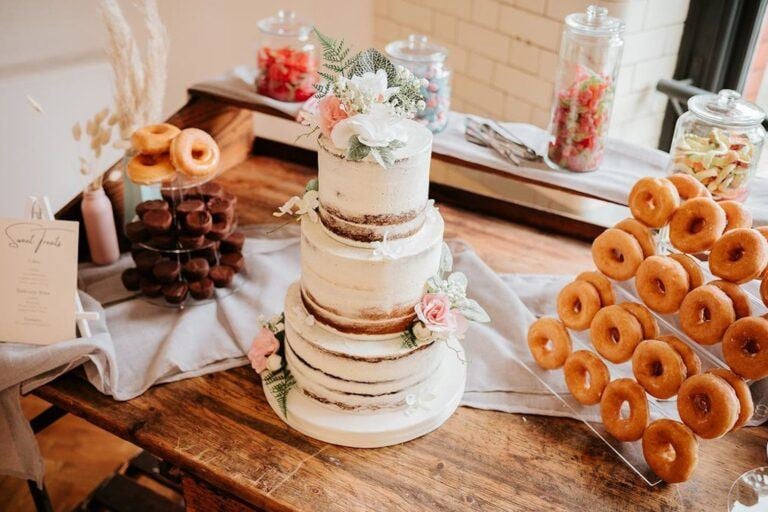
If a wedding cake is a must-have on your big day, but you’re struggling to stay within budget, don’t worry. Below are 13 ways (a bakers’ dozen) you can find an alternative or compromise to save money and keep your budget on track.
1. Have multiple mini cakes
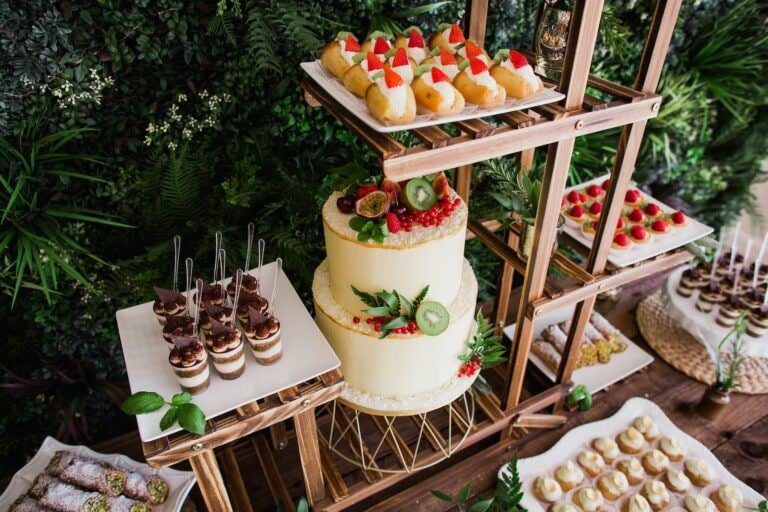
Let them eat cake! Or cupcakes. Or doughnuts. Or brownies. Or maybe even sweets? Instead of having a big central cake, which can be expensive, you could always treat yourself (and your guests) to a dessert table full of your favourite sweet treats. Stack your delicacy of choice in a scrumptious and artistic display and encourage your guests to help themselves. Not only will your guests get cake, but they’ll have a wider variety of choices, too. Plus, you’ll save money at the same time.
Do remember that unlike a professionally made show-stopper, a dessert table is unlikely to be able to be out on display all day. Consider whether you really want a doughnut that has been out in a heated room for 7 hours! Many professional bakers offer brownie towers, which means that whilst saving a little bit on the budget, you can still get all the benefits a professional brings. The tower of smaller cakes may also mean you don’t have a cake to cut. A small store-bought cake in addition is a good way of still having that iconic cake-cutting moment.
2. Slice conservatively
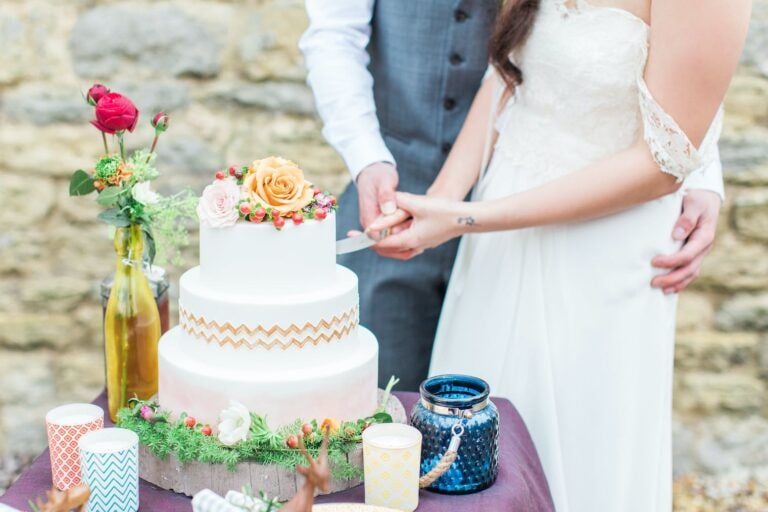
There will be plenty of guests at your wedding who are hungry for a slice of cake, but remember, after a three- or four-course breakfast and a pile of buffet food, will they even be that hungry when the time comes for a slice of cake? Ask your caterers to not be too generous when it comes to slicing your cake. This will help a smaller cake go a lot further. And if the odd guest wants seconds, they can just help themselves.
3. Choose a simple design
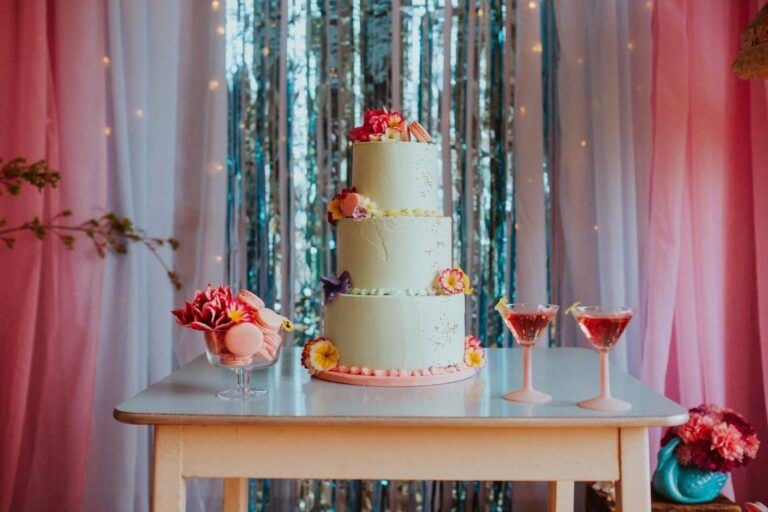
A cake with loads of intricate details and delicate sugar work is going to be expensive. So, if you keep your design simple, most of the baker’s efforts can go into simply making a moist and delicious cake rather than into turning it into a show-stopping edible masterpiece.
Depending on the style of the cake, you may even be able to do some decorations yourself. This is, of course, unlikely to rival a professional baker’s expert creation. You may not have the skill, knowledge or experience to pull off intricate latticework. But there’s nothing etched in stone to say a wedding cake has to be complex. Instead of sugar work petals, go for real flowers artfully placed around the edge. Instead of painstakingly cut iced ribbons, go for real ones. Artistic vision is a must-have, but it requires you to be brave. The DIY look can be great – just be aware that it most likely won’t be able to match the intricacy of a professionally-made wedding cake.
4. Have dummy cake layers
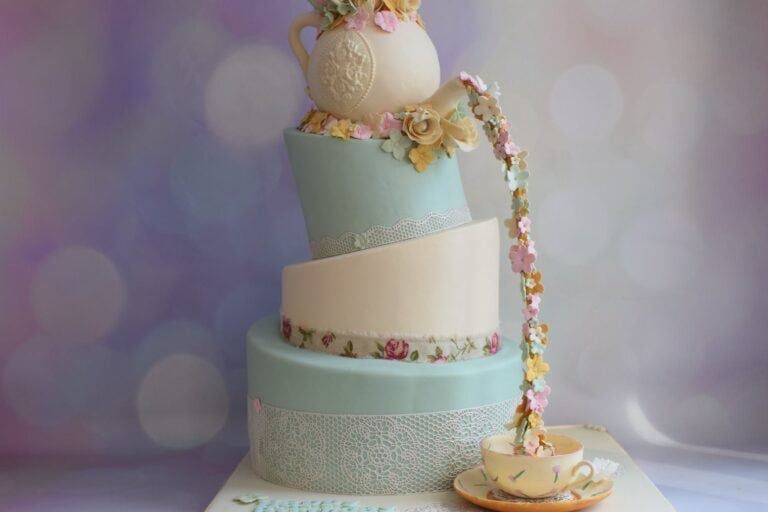
Realistically, not everyone at your wedding will likely want a slice of cake, which breaks our hearts… but it also breaks out hearts to see any cake go to waste. If you still want a tall, multi-tier cake, substitute some of the layers with dummy layers, which are usually lumps of carved polystyrene. These can be decorated in the exact same style as the real layers, but you save on the cost of the cake ingredients and the time spent baking it. It will look just as majestic and yummy, but none of it will go to waste and you’ll save some dough.
That said, be aware that the overall price difference may be quite small. Cake makers usually won’t charge the full amount if some layers are fake, but can still charge close to it. Though you’re saving some ingredient costs and labour, the cake artist will still have to stack and decorate those extra tiers, and as we’ve highlighted above, the decorating is what you’re really paying for in most cases. Ingredient costs can be sometimes be cheaper than the polystyrene purchased to create that fake tier, so it’s best to chat with your cake maker about the most cost-effective option for your specific vision.
5. Ask friends or family
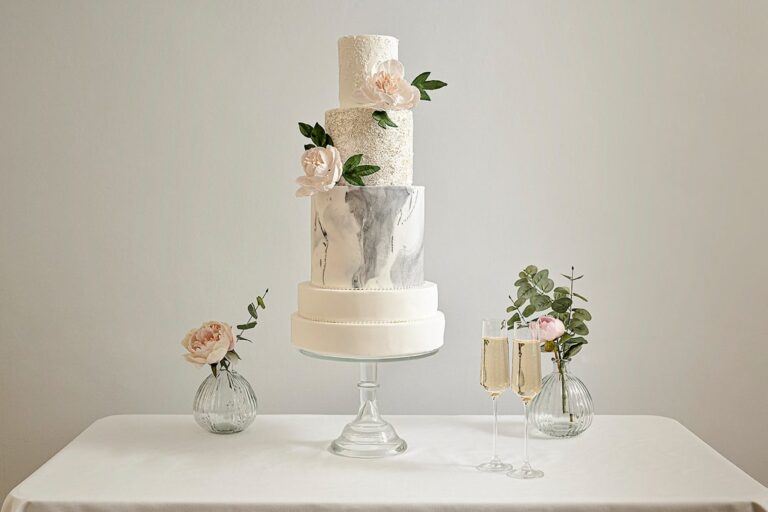
It may seem obvious, but that doesn’t make it any less useful – if you have a future Great British Bake Off contestant in the family who’d love to contribute to your big day, ask them if they’d be happy to make your cake. Or, if you have a collection of relatives and friends who all have a signature sweet treat, why not ask everyone to bake their favourite and bring them in on a nice dish, which you can then collate to make a super tasty dessert table out of?
The DIY route can be a great budget-friendly move, but there are some really important considerations which you’ll need to weigh up:
- It’s never going to be quite the same as a wedding cake made by a skilled professional with years of experience under their belt. If you opt for a cake made by an amateur baker, be prepared to compromise.
- Tiered cakes aren’t just works of art, but also structural masterpieces. Ask any venue about DIY cakes and they’ll talk about the cakes that slowly leaned more and more or fell due to mispositioned or insufficient dowels. The bake itself also has to match the strength it needs and professionals understand the challenges this throws up. Not many amateurs normally make a three-tiered cake that has to stand for a number of hours. So if you are going DIY, keep it simple.
- Your family star baker is unlikely to say no to such a request, but they’re probably going to feel a tremendous amount of pressure. Chances are they won’t relax if they’re a guest until the cake is actually cut into. Again, venues will share stories of seemingly wonderful looking DIY cakes which, when cut into, turned out to be raw, and then the challenge of trying to serve enough not to cause embarrassment for the family member who made it.
- Dietaries are such an important part of your catering, and the importance of avoiding trace elements from nuts to gluten can be a matter of life or death. A professional cake maker will always leave a full set of ingredients, and highlight any cross-contamination risks and cutting requirements if there are dietaries. With a DIY cake, assumptions can be made that a family member knows of a relative’s allergies, or a guest may assume ingredients will be strictly as listed and fine. So, if you are having a DIY cake, put a sign up thanking whoever made it but letting guests know ALL the ingredients, and that it wasn’t made in a professional kitchen. This may sound overcautious (and is easily forgotten), but equally, don’t assume guests with allergies will know or remember it’s a DIY cake, and that their dietaries shared with the caterers haven’t been passed on.
6. Have a shop-bought cake
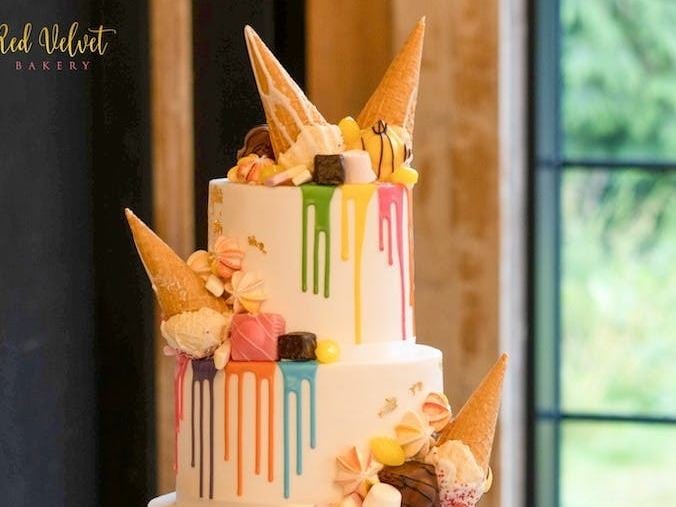
It might not seem like the most obvious choice for a wedding, and it isn’t traditional, but a shop-bought cake from your favourite supermarket can be affordable and delicious. There’s a wide range of shapes, sizes and flavours to choose from, and if you pick up some pillars you can even create a multi-tiered cake yourself. All you have to do is get a little creative with the decorations and be more flexible with your cake vision than if you were to commission something custom-made. Or, you can have a small simple cake for your ceremonial cutting, and a number of shop bought cakes put out for guests to eat afterwards.
For something trendy yet traditional, M&S sells a two-tiered naked cake that looks the part and costs just £45. Or, for something a little more unique that will be tasty and get your guests laughing, M&S also offer a personalised Colin the Caterpillar cake, which you can pair with a personalised Connie the Caterpillar cake to have matching couple cakes. Each cake serves 40, and is priced at just £50, so even if you buy both, that’s cake for 80 guests for just £100, making them a fraction of the typical cost of a traditional bespoke tiered design.
7. Choose a naked cake
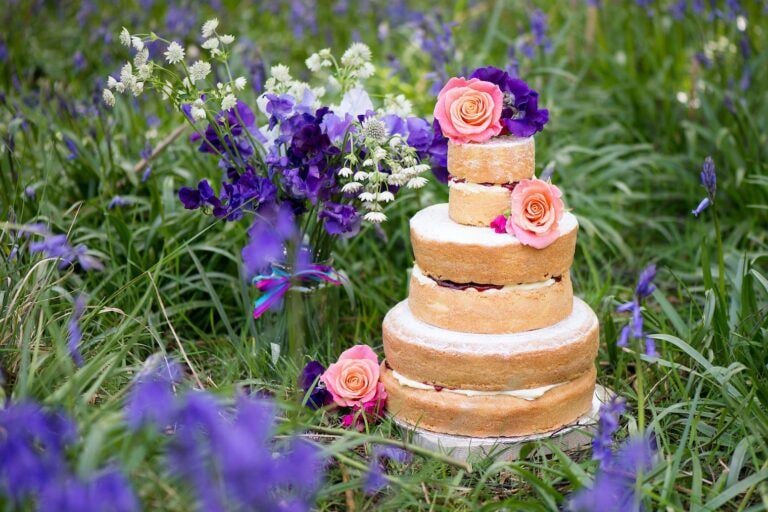
If you choose to hire a professional cake maker to design your wedding cake, why not ask them for a naked cake? Not only will you still get a premium cake by a professional, but naked cakes are really in fashion right now with a rustic but elegant look. Plus, they tend to be a lot cheaper because they generally use fewer ingredients and take less time to decorate.
A word of warning though – the icing on wedding cakes can play a big part in the structural strength. Naked cakes may seem an easier option for a DIY cake (after all, the icing looks like the hard part), but they need more dowels, internal supports and the right baking consistency if stacked on top of one another. This is where professionals are even more invaluable.
8. Only have half the cake decorated
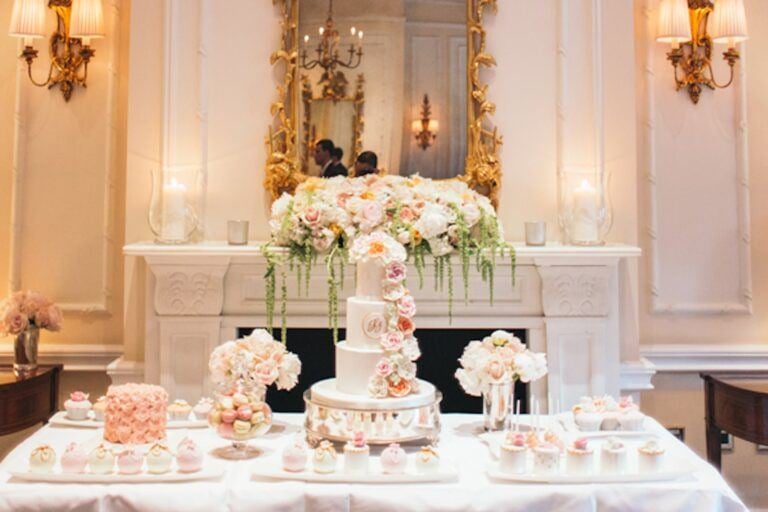
Looking for a complex and intricate design but don’t have a huge budget? One option is to work with your cake maker to design a cake that is only decorated down one side. By having a sugar work design cascading down one half of your cake you still get the wow factor but will generally only have to pay half the decorating costs. A sugar work cascade is still incredibly striking, and can make for a gorgeous focal point and centrepiece even with less decoration.
9. Buy a local cake
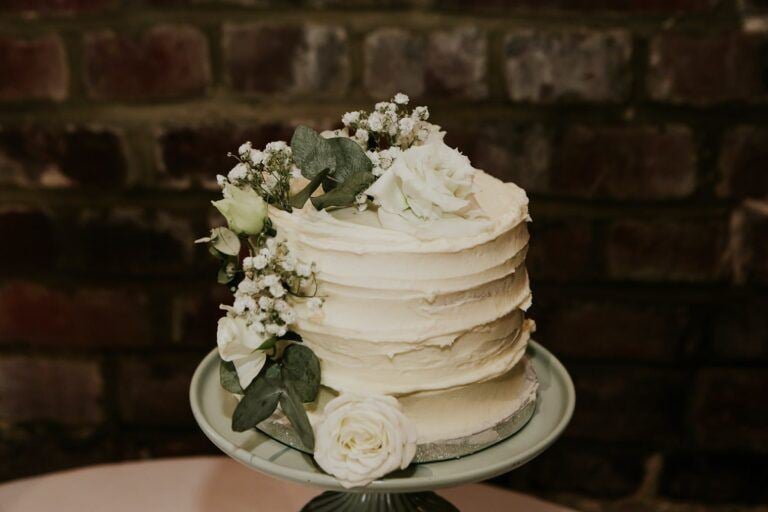
When searching for a wedding cake designer or bakery, try to keep your search as local as possible. Wedding cake delivery can be pricey and the further a cake has to travel the riskier it is – so, if you choose a local professional, it’ll keep delivery and setup costs down. Or, you could even consider collecting your cake a day or so before the big day, which is easier to do if you choose a simple design.
10. Hire an up-and-coming cake maker
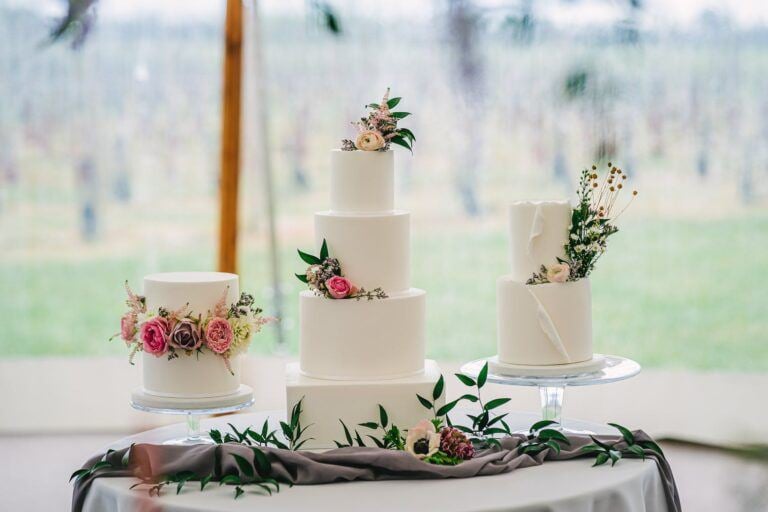
The more experience a baker has, the more likely they are to have a solid portfolio and reputation. As a result, they’re also more likely to charge higher prices. Instead, consider hiring a cake maker who is relatively new to the industry. They’ll still be able to make a fabulous and delicious cake, but charge less than the average. Just remember to see examples of a few other cakes they’ve designed before you hire them – you don’t want a complete novice taking charge of your wedding cake.
11. Bake your own cake
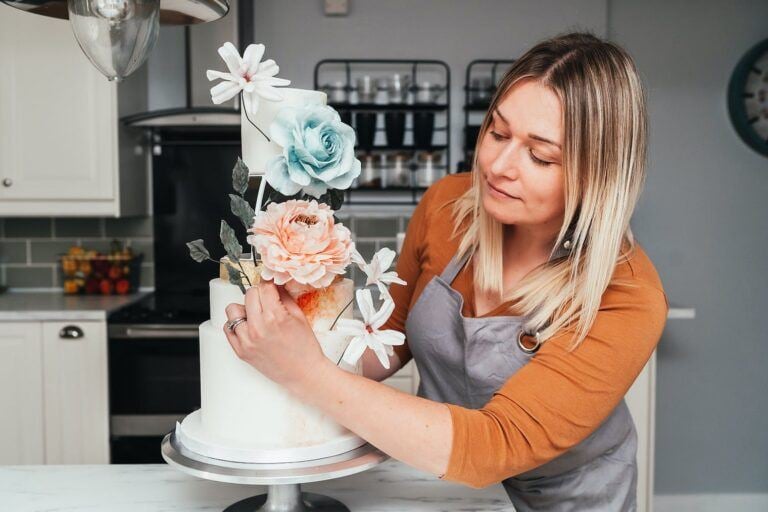
If you’re a keen baker and don’t mind adding an extra responsibility to your ever-growing list, you could just bake your wedding cake yourself. You could even bake the cake a couple of months in advance, then thaw it a few days before your wedding so it’s ready for some homemade decorations. This will naturally save you money, but will be a fair bit of work, so be prepared.
Part of the joy of hiring a professional cake maker is that it’s stress-free and convenient, so you can enjoy your big day without worrying about dodgy ovens and equipment or glazes and ganaches that refuse to set. It’s important to weigh up what matters most to you. The DIY route may save you some money, but it most likely won’t save you time or stress. All of the considerations we listed for asking a friend or family to bake your cake apply here as well.
12. Choose your flavours wisely
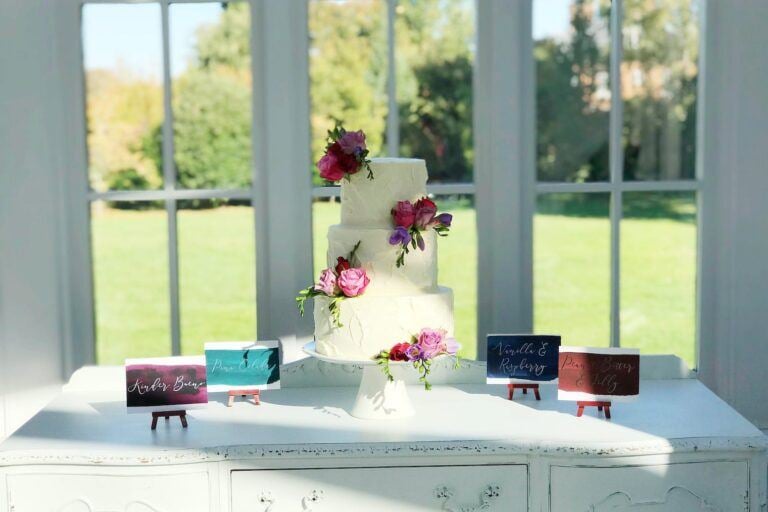
Vanilla and chocolate are usually safe, crowd-pleasing flavours that don’t cost too much. If you’ve chosen a multi-tiered cake, you may still want one tier to be a traditional fruit cake, but be prepared to pay a little extra if that’s the case.
Most of your guests won’t be too fussed if you don’t have fruit cake, and a simple vanilla sponge is affordable and tasty.
13. Keep the cake, ditch the dessert
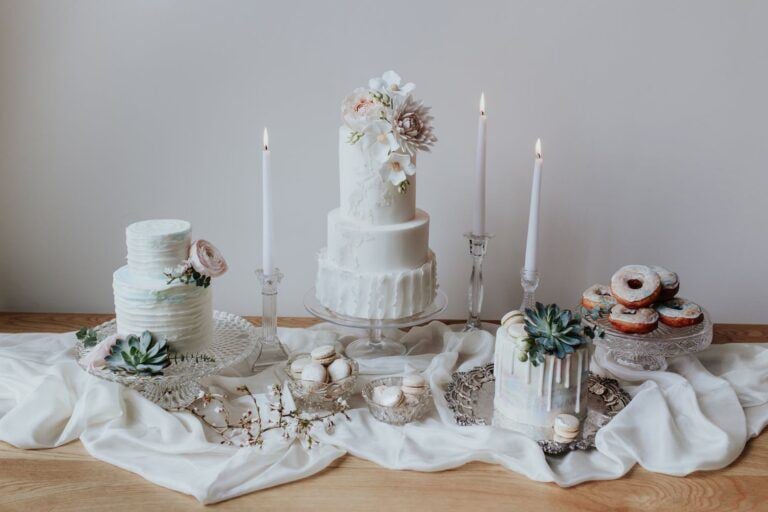
Have you worked out the menu you plan to serve your guests at the wedding breakfast? We bet part of that meal will include a delicious dessert. Well, instead of doubling up on desserts, why not simply serve your guests a slice of wedding cake?
If this doesn’t suit your timings and you want your dessert before the cake-cutting commences, why not have a smaller, decorated one-tier cake as your main cake for the ceremonial cutting, and a plain, un-decorated version pre-cut and served as dessert for the beforehand?
To make your cake a little more dessert-like and wedding breakfast worthy, why not pair it with a scoop of ice cream or a quenelle of cream for that extra touch of luxury and finesse?
Or, if you want to serve your cake in the evening, consider whether you also need extra evening food. This way, you can make the cake the star of the show in more ways than one . This is a great way to save on your catering budget elsewhere without losing the cake.
Plan your dream wedding with Bridebook
At Bridebook, we have plenty of tips, advice and tools available to help you plan your wedding and save money. Sign up today and start planning!
Browse other similar articles…
- How Much Does a Wedding Cake Cost? The 2024 Average Revealed
- The Ultimate Wedding Budget Breakdown
- How Much Does a Wedding Cost? The 2024 UK Average
- Introduction: Your Wedding Budget
- Hidden Wedding Costs Every Couple Needs To Know About
- Wedding Etiquette: Who (Traditionally) Pays For What?
